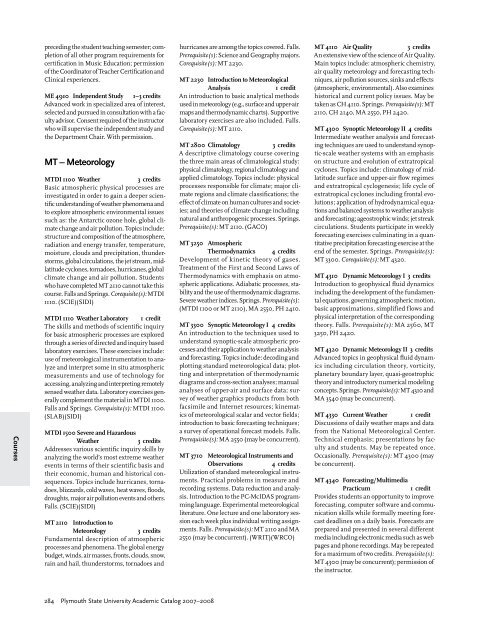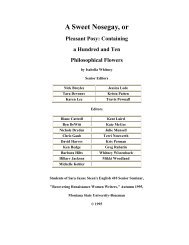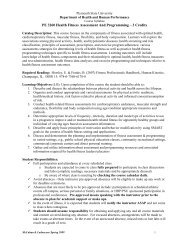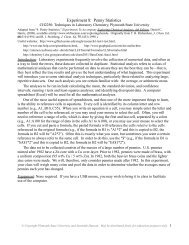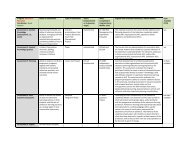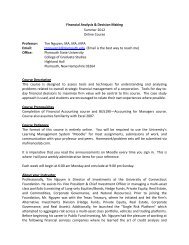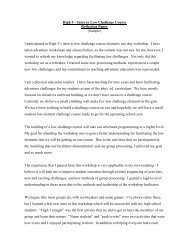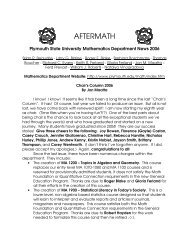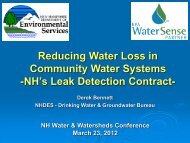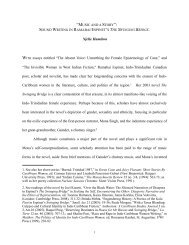ME 2210 Voice Class II/Pedagogy 1 creditContinuation of development of skills of VoiceClass I with emphasis on voice pedagogy.Emphasis on solo and group performanceand evaluation. Springs. Prerequisite(s): ME1200. (ARTS)ME 2340 Music TeachingApprenticeship 1 creditSupervised field experience prior to formal studentteaching in which the student is involvedin the music classroom and rehearsal for aminimum of two hours per week for a periodof ten weeks. With permission. Prerequisite(s):open only to Music Education majors.ME 3110 Music in the ElementarySchool3 creditsBasic procedures, methods and materialsfor teaching music in grades K–6. Includesdemonstration, observation and simulationof teaching at this level. Falls.ME 3160 Percussion Class 1 creditBasic performance skills and teaching techniquesfor selected percussion instruments.Springs. Prerequisite(s): open only to BS MusicEducation majors.ME 3210 Upper Brass Techniques 1 creditBasic performance skills and teachingtechniques for trumpet and French horn.Falls. Prerequisite(s): open only to BS MusicEducation majors.ME 3220 Lower Brass Techniques 1 creditBasic performance skills and teaching techniquesfor trombone, baritone horn and tuba.Springs. Prerequisite(s): open only to BS MusicEducation majors.ME 3250 Choral Conducting 2 creditsPreparation and interpretation of choral scoresfor rehearsals and performances. Fall of evenyears. Prerequisite(s): MU 2260; open only toBA Music and BS Music Education majors andMusic minors.ME 3260 InstrumentalConducting 2 creditsPreparation and interpretation of instrumentalscores for rehearsals and performances. Fall ofodd years. Prerequisite(s): MU 2260; open onlyto BA Music and BS Music Education majorsand Music minors.ME 3340 Choral Literature andTechniques2 creditsOrganization and development of choralensembles: recruitment, auditions, voiceclassifications, etc. Survey of choral repertoireappropriate for wide variety of choral groups.Fall of odd years. Prerequisite(s): open only toBA Music and BS Music Education majors andMusic minors.ME 3350 Instrumental Literature andTechniques2 creditsOrganization and development of instrumentalensembles: recruitment, scheduling,instructional materials, etc. Survey of solo andensemble literature and individual methods.Springs. Prerequisite(s): open only to BS MusicEducation majors.ME 3500 Technology for MusicEducators3 creditsExamines the history and evolution of musictechnology in music education and how itimpacts music curriculum development,music education, culture and society. Exploresmusic education, music administration, musicnotation and music sequencing software, MIDI(Musical Instrument Digital Interface) techniques,synthesis, programs and equipmentthat support MIDI and music notation for themusic educator. Students acquire proficiencyin MIDI technology and demonstrate thatproficiency by designing a curriculum thatintegrates music technology into the musicclassroom. Students also turn in a music notationproject. Springs. Prerequisite(s): BS MusicEducation majors only. (TECH)(TECO)ME 4200 Secondary School MusicMethods3 creditsBasic procedures, methods and materials forteaching music in grades 7–12. Special emphasison upper middle school general music.Includes demonstrations, observation andsimulation of teaching at this level. Springs.ME 4500 Senior Recital: MusicEducation0 creditMusic Education majors are required to enrollin ME 4500 and to present a full recital program.This requirement may also be satisfiedby sharing a recital with another student. A prerecitaljury before the faculty is required at leastfour weeks prior to the scheduled recital date.Pass/No Pass. Falls and Springs. Corequisite(s):4000 level Performance Studies.ME 4850 Kindergarten Through Grade 12Student Teaching 12 creditsThe culminating field-based experience forMusic Education majors, leading to teachercertification. It is a continuous, full-timeexperience during which students graduallyassume responsibilities for a full range ofmusic teaching activities. Student Teachingis conducted under the guidance of school faculty(cooperating teachers) and clinical faculty(University appointed observers). Requiredseminars complement the experience. Fallsand Springs. Prerequisite(s): minimum 2.50cumulative GPA; minimum 2.50 compositeGPA [calculated from ME 1160, ME 1200, ME2150, ME 2170, ME 2180, ME 2190, ME 2200,ME 2210, ME 3160, ME 3210, ME 3220, (ME3250 or ME 3260), (ME 3340 or ME 3350), ME3500, MU 1210, MU 1220, MU 2210, MU 2220,MU 2260, MU 3310, MU 3320]; minimumgrade of C in ME 3110 and ME 4200; successfulcompletion of the Piano Proficiency Examby the beginning of the semester immediatelypreceding the student teaching semester; completionof all other program requirements forcertification in Music Education; permissionof the Coordinator of Teacher Certification andClinical experiences.ME 4860 Student Teaching K–12:Elementary Component 6 creditsThe culminating field-based experience forMusic Education majors, leading to teachercertification. It is a continuous, full-timeexperience during which students graduallyassume responsibilities for a full range ofmusic teaching activities. Student Teachingis conducted under the guidance of school faculty(cooperating teachers) and clinical faculty(University appointed observers). Requiredseminars complement the experience. Fallsand Springs. Prerequisite(s): minimum 2.50cumulative GPA; minimum 2.50 compositeGPA [calculated from ME 1160, ME 1200, ME2150, ME 2170, ME 2180, ME 2190, ME 2200,ME 2210, ME 3160, ME 3210, ME 3220, (ME3250 or ME 3260), (ME 3340 or ME 3350), ME3500, MU 1210, MU 1220, MU 2210, MU 2220,MU 2260, MU 3310, MU 3320]; minimumgrade of C in ME 3110 and ME 4200; successfulcompletion of the Piano Proficiency Examby the beginning of the semester immediatelypreceding the student teaching semester; completionof all other program requirements forcertification in Music Education; permissionof the Coordinator of Teacher Certification andClinical experiences.ME 4870 Student Teaching K–12:Secondary Component 6 creditsThe culminating field-based experience forMusic Education majors, leading to teachercertification. It is a continuous, full-timeexperience during which students graduallyassume responsibilities for a full range ofmusic teaching activities. Student Teachingis conducted under the guidance of school faculty(cooperating teachers) and clinical faculty(University appointed observers). Requiredseminars complement the experience. Fallsand Springs. Prerequisite(s): minimum 2.50cumulative GPA; minimum 2.50 compositeGPA [calculated from ME 1160, ME 1200, ME2150, ME 2170, ME 2180, ME 2190, ME 2200,ME 2210, ME 3160, ME 3210, ME 3220, (ME3250 or ME 3260), (ME 3340 or ME 3350), ME3500, MU 1210, MU 1220, MU 2210, MU 2220,MU 2260, MU 3310, MU 3320]; minimumgrade of C in ME 3110 and ME 4200; successfulcompletion of the Piano Proficiency Examby the beginning of the semester immediatelyCourses<strong>Plymouth</strong> <strong>State</strong> University <strong>Academic</strong> <strong>Catalog</strong> <strong>2007</strong>–<strong>2008</strong> 283
Coursespreceding the student teaching semester; completionof all other program requirements forcertification in Music Education; permissionof the Coordinator of Teacher Certification andClinical experiences.ME 4910 Independent Study 1–3 creditsAdvanced work in specialized area of interest,selected and pursued in consultation with a facultyadvisor. Consent required of the instructorwho will supervise the independent study andthe Department Chair. With permission.MT – MeteorologyMTDI 1100 Weather3 creditsBasic atmospheric physical processes areinvestigated in order to gain a deeper scientificunderstanding of weather phenomena andto explore atmospheric environmental issuessuch as: the Antarctic ozone hole, global climatechange and air pollution. Topics include:structure and composition of the atmosphere,radiation and energy transfer, temperature,moisture, clouds and precipitation, thunderstorms,global circulations, the jet stream, midlatitudecyclones, tornadoes, hurricanes, globalclimate change and air pollution. Studentswho have completed MT 2110 cannot take thiscourse. Falls and Springs. Corequisite(s): MTDI1110. (SCIE)(SIDI)MTDI 1110 Weather Laboratory 1 creditThe skills and methods of scientific inquiryfor basic atmospheric processes are exploredthrough a series of directed and inquiry basedlaboratory exercises. These exercises include:use of meteorological instrumentation to analyzeand interpret some in situ atmosphericmeasurements and use of technology foraccessing, analyzing and interpreting remotelysensed weather data. Laboratory exercises generallycomplement the material in MTDI 1100.Falls and Springs. Corequisite(s): MTDI 1100.(SLAB)(SIDI)MTDI 1500 Severe and HazardousWeather3 creditsAddresses various scientific inquiry skills byanalyzing the world’s most extreme weatherevents in terms of their scientific basis andtheir economic, human and historical consequences.Topics include hurricanes, tornadoes,blizzards, cold waves, heat waves, floods,droughts, major air pollution events and others.Falls. (SCIE)(SIDI)MT 2110 Introduction toMeteorology 3 creditsFundamental description of atmosphericprocesses and phenomena. The global energybudget, winds, air masses, fronts, clouds, snow,rain and hail, thunderstorms, tornadoes andhurricanes are among the topics covered. Falls.Prerequisite(s): Science and Geography majors.Corequisite(s): MT 2230.MT 2230 Introduction to MeteorologicalAnalysis1 creditAn introduction to basic analytical methodsused in meteorology (e.g., surface and upper-airmaps and thermodynamic charts). Supportivelaboratory exercises are also included. Falls.Corequisite(s): MT 2110.MT 2800 Climatology 3 creditsA descriptive climatology course coveringthe three main areas of climatological study:physical climatology, regional climatology andapplied climatology. Topics include: physicalprocesses responsible for climate; major climateregions and climate classifications; theeffect of climate on human cultures and societies;and theories of climate change includingnatural and anthropogenic processes. Springs.Prerequisite(s): MT 2110. (GACO)MT 3250 AtmosphericThermodynamics 4 creditsDevelopment of kinetic theory of gases.Treatment of the First and Second Laws ofThermodynamics with emphasis on atmosphericapplications. Adiabatic processes, stabilityand the use of thermodynamic diagrams.Severe weather indices. Springs. Prerequisite(s):(MTDI 1100 or MT 2110), MA 2550, PH 2410.MT 3300 Synoptic Meteorology I 4 creditsAn introduction to the techniques used tounderstand synoptic-scale atmospheric processesand their application to weather analysisand forecasting. Topics include: decoding andplotting standard meteorological data; plottingand interpretation of thermodynamicdiagrams and cross-section analyses; manualanalyses of upper-air and surface data; surveyof weather graphics products from bothfacsimile and Internet resources; kinematicsof meteorological scalar and vector fields;introduction to basic forecasting techniques;a survey of operational forecast models. Falls.Prerequisite(s): MA 2550 (may be concurrent).MT 3710 Meteorological Instruments andObservations 4 creditsUtilization of standard meteorological instruments.Practical problems in measure andrecording systems. Data reduction and analysis.Introduction to the PC-McIDAS programminglanguage. Experimental meteorologicalliterature. One lecture and one laboratory sessioneach week plus individual writing assignments.Falls. Prerequisite(s): MT 2110 and MA2550 (may be concurrent). (WRIT)(WRCO)MT 4110 Air Quality3 creditsAn extensive view of the science of Air Quality.Main topics include: atmospheric chemistry,air quality meteorology and forecasting techniques,air pollution sources, sinks and effects(atmospheric, environmental). Also examineshistorical and current policy issues. May betaken as CH 4110. Springs. Prerequisite(s): MT2110, CH 2140, MA 2550, PH 2420.MT 4300 Synoptic Meteorology II 4 creditsIntermediate weather analysis and forecastingtechniques are used to understand synoptic-scaleweather systems with an emphasison structure and evolution of extratropicalcyclones. Topics include: climatology of midlatitudesurface and upper-air flow regimesand extratropical cyclogenesis; life cycle ofextratropical cyclones including frontal evolutions;application of hydrodynamical equationsand balanced systems to weather analysisand forecasting; ageostrophic winds; jet streakcirculations. Students participate in weeklyforecasting exercises culminating in a quantitativeprecipitation forecasting exercise at theend of the semester. Springs. Prerequisite(s):MT 3300. Corequisite(s): MT 4320.MT 4310 Dynamic Meteorology I 3 creditsIntroduction to geophysical fluid dynamicsincluding the development of the fundamentalequations, governing atmospheric motion,basic approximations, simplified flows andphysical interpretation of the correspondingtheory. Falls. Prerequisite(s): MA 2560, MT3250, PH 2420.MT 4320 Dynamic Meteorology II 3 creditsAdvanced topics in geophysical fluid dynamicsincluding circulation theory, vorticity,planetary boundary layer, quasi-geostrophictheory and introductory numerical modelingconcepts. Springs. Prerequisite(s): MT 4310 andMA 3540 (may be concurrent).MT 4330 Current Weather 1 creditDiscussions of daily weather maps and datafrom the National Meteorological Center.Technical emphasis; presentations by facultyand students. May be repeated once.Occasionally. Prerequisite(s): MT 4300 (maybe concurrent).MT 4340 Forecasting/MultimediaPracticum1 creditProvides students an opportunity to improveforecasting, computer software and communicationskills while formally meeting forecastdeadlines on a daily basis. Forecasts areprepared and presented in several differentmedia including electronic media such as webpages and phone recordings. May be repeatedfor a maximum of two credits. Prerequisite(s):MT 4300 (may be concurrent); permission ofthe instructor.284 <strong>Plymouth</strong> <strong>State</strong> University <strong>Academic</strong> <strong>Catalog</strong> <strong>2007</strong>–<strong>2008</strong>
- Page 1 and 2:
Plymouth State Universityof the uni
- Page 3 and 4:
Catalog LimitationsThis catalog des
- Page 5 and 6:
President’s MessageIn choosing Pl
- Page 7 and 8:
The UniversityThe UniversityPlymout
- Page 10 and 11:
Hartman Union Building (known as th
- Page 12 and 13:
Admission, Tuition, Fees, and Finan
- Page 14 and 15:
Application RequirementsStudents of
- Page 16 and 17:
ResidencyAll students attending Ply
- Page 18 and 19:
student health services, and studen
- Page 20 and 21:
Third-Party PaymentsExternal (non-P
- Page 22 and 23:
Student LifePlymouth State Universi
- Page 24 and 25:
Dining ServicesDining services at P
- Page 26 and 27:
Wellness ProgramsPlymouth State Uni
- Page 28 and 29:
Academic ResourcesPlymouth State Un
- Page 30 and 31:
Undergraduate Advising CenterIn add
- Page 32 and 33:
each student and pay special attent
- Page 34 and 35:
and that credits earned will apply
- Page 36 and 37:
ROTCStudents attending Plymouth Sta
- Page 38 and 39:
InternshipsThe Bagley Center is the
- Page 40 and 41:
Child Development and Family Center
- Page 42 and 43:
service is available at any stage o
- Page 44 and 45:
Academic Policies and ProceduresPly
- Page 46 and 47:
instructor shall pursue the complai
- Page 48 and 49:
Whenever students have been convict
- Page 50 and 51:
RegistrationMatriculated (Degree-Se
- Page 52 and 53:
Students who wish to re-enter Plymo
- Page 54 and 55:
No Plymouth State University course
- Page 56 and 57:
PSU, financial aid awards may be in
- Page 58 and 59:
esolution, the chair of the instruc
- Page 60 and 61:
2.00 or above, may, no sooner than
- Page 62 and 63:
wish to participate, must first mee
- Page 64 and 65:
Academic ProgramsPlymouth State Uni
- Page 66 and 67:
Communication Studies, Badepartment
- Page 68 and 69:
Degree Programs - DepartmentalDepar
- Page 70 and 71:
courses are designed to excite stud
- Page 72 and 73:
These courses also encourage studen
- Page 74 and 75:
** These Connections are three-cred
- Page 76 and 77:
Physicsdepartment of Chemical,earth
- Page 78 and 79:
Year TwoCreditsStudio Core - comple
- Page 80 and 81:
Year TwoCreditsStudio Core - comple
- Page 82 and 83:
Year TwoCreditsStudio Core - comple
- Page 84 and 85:
Year TwoCreditsStudio Core - comple
- Page 86 and 87:
AR Studio elective [not ARDI] 3AR S
- Page 88 and 89:
CD 3000 Philosophical and Historica
- Page 90 and 91:
Allowable Department of Art Academi
- Page 92 and 93:
Year ThreeCreditsBI 3060 Genetics 4
- Page 94 and 95:
CH 2130 General Chemistry I (QRCO)
- Page 96 and 97:
CH 2130 General Chemistry I (QRCO)
- Page 98 and 99:
EC 2560 Microeconomics 3EC 3580 Man
- Page 100 and 101:
Recommended Course SequenceCheck al
- Page 102 and 103:
Mathematics Foundations - complete
- Page 104 and 105:
BU 4200 Training and DevelopmentBU
- Page 106 and 107:
PS 3190 Development and Understandi
- Page 108 and 109:
CH 3450 Physical Chemistry I 4CH 34
- Page 110 and 111:
Year ThreeCreditsMT 3710 Meteorolog
- Page 112 and 113:
Meteorology Minor17 or 18 creditsTh
- Page 114 and 115:
Year TwoCreditsCM 2910 Introduction
- Page 116 and 117:
CM 3640 Communication TheoryCM 3700
- Page 118 and 119:
Degree RequirementsCreditsCS 2010 C
- Page 120 and 121:
Degree RequirementsCreditsCJ 1010 T
- Page 122 and 123:
Year Four at Franklin Pierce Law Ce
- Page 124 and 125:
Cluster III:ED 4401 Inclusive Eleme
- Page 126 and 127:
Year ThreeCreditsCD 3000 Philosophi
- Page 128 and 129:
Degree RequirementsCreditsCourses r
- Page 130 and 131:
Recommended Course SequenceCheck al
- Page 132 and 133:
CTDI Creative Thought Directions 6P
- Page 134 and 135:
Integration Connection - complete o
- Page 136 and 137:
Writing OptionDegree RequirementsCr
- Page 138 and 139:
EN 3610 Currents in British Literat
- Page 140 and 141:
Year ThreeCreditsAdventure Educatio
- Page 142 and 143:
AT 3760 requires a minimum cumulati
- Page 144 and 145:
PE 2731 Motor Development (WRCO) 3.
- Page 146 and 147:
and a philosophical understanding s
- Page 148 and 149:
PE 2428 Flexibility, Core and Balan
- Page 150 and 151:
Year TwoCreditsGroup A Activity - c
- Page 152 and 153:
• minimum 42 credits earned• mi
- Page 154 and 155:
Sport Physiology Minor20 creditsThe
- Page 156 and 157:
HI 3352 African-American History (D
- Page 158 and 159:
In addition to the courses in the I
- Page 160 and 161:
and/or internships. The minimum req
- Page 162 and 163:
Department of Languages andLinguist
- Page 164 and 165:
ED 2000 Introduction to Education 3
- Page 166 and 167:
SSDI Self and Society Directions 6e
- Page 168 and 169:
SIDI Scientific Inquiry Directions
- Page 170 and 171:
Year Three or FourCreditsMA 3400 Ti
- Page 172 and 173:
CTDI Creative Thought Directions 6P
- Page 174 and 175:
Complete one of the following: 3-4M
- Page 176 and 177:
Year FourCreditsME/MU 3000/4000 lev
- Page 178 and 179:
MU 1540 Piano Performance Studies (
- Page 180 and 181:
addition, successful completion of
- Page 182 and 183:
TH 3670 Advanced Practicum in Produ
- Page 184 and 185:
The subjects covered in Topics cour
- Page 186 and 187:
TH 3210 Script Analysis 3TH 3670 Ad
- Page 188 and 189:
Electives: 5-3DN courses, not alrea
- Page 190 and 191:
Religious Studies Minor15 creditsCr
- Page 192 and 193:
Degree RequirementsCreditsCourses r
- Page 194 and 195:
CTDI Creative Thought Directions 6P
- Page 196 and 197:
Department of Social ScienceDepartm
- Page 198 and 199:
AN 3190 Anthropology of the Pacific
- Page 200 and 201:
EPL 4990 Advanced Planning 3BI 3240
- Page 202 and 203:
AN 2210 Cultural Anthropology (GACO
- Page 204 and 205:
think like a historian. The study o
- Page 206 and 207:
Quantitative Reasoning in the Disci
- Page 208 and 209:
Social Science, Bachelor of Science
- Page 210 and 211:
Social Science Electives - complete
- Page 212 and 213:
Department of Social WorkDepartment
- Page 214 and 215:
Year FourCreditsSW 3460 Human Diver
- Page 216 and 217:
Recommended Course SequenceCheck al
- Page 218 and 219:
SW 3510 Theory and Practice of Soci
- Page 220 and 221:
SO 2220 Foundations of Sociology (D
- Page 222 and 223:
• Childhood Studies with an optio
- Page 224 and 225:
Gate: The term gate is commonly use
- Page 226 and 227:
complete the required portfolio as
- Page 228 and 229:
is printed under one discipline and
- Page 230 and 231:
GPA; completion of program requirem
- Page 232 and 233:
in the world. As we look at African
- Page 234 and 235: and theory. Heavily emphasizes rese
- Page 236 and 237: AR - Fine ArtAR 1040 Fundamentals o
- Page 238 and 239: AT - Athletic TrainingAT 1010 Intro
- Page 240 and 241: BI - BiologyBIDI 1010 General Biolo
- Page 242 and 243: BI 4600 Internship 1-4 creditsStude
- Page 244 and 245: gramming, the assignment model, the
- Page 246 and 247: management, interpersonal influence
- Page 248 and 249: ing the first two weeks of the seme
- Page 250 and 251: CJ 3030 Introduction to ForensicSci
- Page 252 and 253: theories that attempt to explain th
- Page 254 and 255: course and then focuses on more adv
- Page 256 and 257: DN 1260 Modern Dance I 1-2 creditsT
- Page 258 and 259: immediately prior to graduation; mi
- Page 260 and 261: ating teacher and members of the Un
- Page 262 and 263: talk, slang, swearing, etc.) and li
- Page 264 and 265: EN 4420 English StudentTeaching 5-1
- Page 266 and 267: Investigates the origins of contemp
- Page 268 and 269: using specialized law enforcement v
- Page 270 and 271: GE 3330 Population Dynamics 3 credi
- Page 272 and 273: HE 3760 Planning and ImplementingHe
- Page 274 and 275: mixed society brought with it and t
- Page 276 and 277: HI 4358 Public History and LocalHis
- Page 278 and 279: provided that each course taken has
- Page 280 and 281: MA - MathematicsMA 1200 Topics in A
- Page 282 and 283: perspectives. These perspectives in
- Page 286 and 287: MT 4350 Forecasting/RadioPracticum1
- Page 288 and 289: Enrollment in Performance Studies r
- Page 290 and 291: MU 3490 Practicum 1-3 creditsPracti
- Page 292 and 293: PE --Physical EducationPE 1000 Flag
- Page 294 and 295: PE 2280 Water Safety Instruction 2
- Page 296 and 297: PE 3570 Kinesiology 3 creditsFundam
- Page 298 and 299: PH 2140 Physics II4 creditsIntroduc
- Page 300 and 301: PO 3810 Political Thought 3 credits
- Page 302 and 303: philosophical opinion among some ma
- Page 304 and 305: RL 2500 Language and LiteracyDevelo
- Page 306 and 307: SO 3350 Sociology of PopularCulture
- Page 308 and 309: in Spanish. Unscheduled. Prerequisi
- Page 310 and 311: individuals. Helps students to deve
- Page 312 and 313: important element. Ability to read
- Page 314 and 315: DirectoriesPlymouth State Universit
- Page 316 and 317: University AdministrationPrincipal
- Page 318 and 319: Birch, Megan L. (2007)Assistant Pro
- Page 320 and 321: Fedorchak, Paul (1992)Department Ch
- Page 322 and 323: Kim, Jong-Yoon (2001)Assistant Prof
- Page 324 and 325: Middlekauff, Bryon D. (1988)Profess
- Page 326 and 327: Superchi, Gregory S. (2006)Adjunct
- Page 328 and 329: John H. MoodyDerryJohn J. Ouellette
- Page 330 and 331: Credits Awarded for Acceptable CLEP
- Page 332 and 333: IndexAAcademic Advising 28Academic
- Page 334 and 335:
Music Technology Option,BA Music 17
- Page 336 and 337:
Campus MapCampus Buildings1 College
- Page 338:
plymouth, nh 03264-1595(603) 535-50


